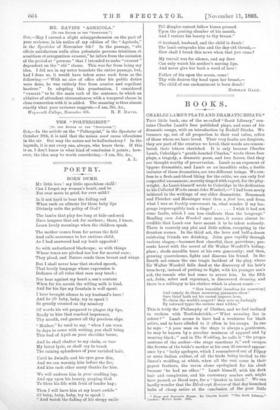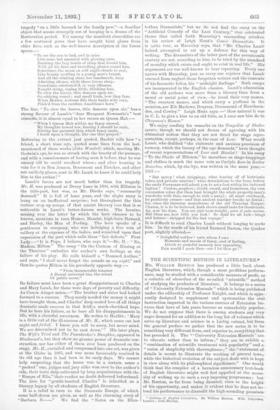BOOKS.
CHARLES LAMB'S PLAYS AND DRAMATIC ESSAYS.. Tars little book, one of the so-called "Scott Library," con- tains Charles Lamb's four published plays, and some of his dramatic essays, with an introduction by Rudolf Dircks. We treasure up, out of all proportion to their real value, relics of those whom we have loved. Their very faults are forgiven, they are part of the creature we loved, their words are remem- bered, their letters cherished. It is only because Charles Lamb, Coleridge's "gentle-hearted Charles," wrote these four plays, a tragedy, a dramatic poem, and two farces, that they are thought worthy of preservation. Lamb as an exponent a bygone dramatists, and Lamb as an inaudible echo, a feeble imitator of those dramatists, are two different beings. We con- fess to a flesh-and-blood liking for the critic, eve can only feel respectful amusement, secretly tinged with regret, for the play- wright. As Lamb himself wrote to Coleridge in the dedication to his Collected Works anent John Woodvil,—" I had been newly initiated in the writings of our elder dramatists. Beaumont, and Fletcher and Messinger were then a first love, and from what I was so freshly conversant in, what wonder if my lan- guage imperceptibly took a tinge P I wish it had not some faults, which I can less vindicate than the language." Reading over John Woodvil once more, it seems almost in- credible that Lamb can have meant it to be taken seriously. There is scarcely any plot and little action, excepting in the drunken scenes. In the third act, the hero and half-a-dozen roistering friends are drinking. John goes rapidly through various stages,—becomes first cheerful, then garrulous ; pre- sents Lovel with the secret of Sir Walter Woodvil's hiding- place ; sheds maudlin tears at his own generosity ; and then, growing quarrelsome, tights and disarms his friend. In the fourth act comes the one tragic incident of the play, where Sir Walter Woodvil falls dead at the discovery of his heir's treachery, instead of putting to flight, with his younger son's aid, the rascals who had come to arrest him. In the fifth act, John, sober and repentant, is discovered dressing, and there is a soliloquy to his clothes which is almost comic :— "How beautiful [handling his mourning]
And comely do these mourning garments show! Sure Grief bath set his sacred impress here, , To claim the world's respect ! they note so feelingly By outward types the serious man within."
This is truly the Philosophy of Clothes, and we feel inclined to exclaim with Teufelsdrockh,—" What meaning lies in colour ?" Lamb seems to have had a weakness for black attire, and to have alluded to it often in his essays. In one he says : "A poor man on the stage is always a gentleman, he may be known by a peculiar neatness of apparel and by wearing black ;" and in The Wedding, he calls it "the proper costume of the author—the stage sanctions it," and escapes the frowns of the bride's mother at his own ill-omened appear- ance by a "lucky apologue, which I remembered out of Pilpay or some Indian author, of all the birds being invited to the linnet's wedding, at which, when all the rest came in their gayest feathers, the raven alone apologised for his cloak because he had no other.'" Lamb himself, with his dark hair and complexion, and his customary sombre snit, might have passed, as Hood says, for a "Quaker in black." We can hardly wonder that the Edinburgh Review of that day launched bolts of cheap satire at the conclusion of the poor little Plow+ and, Brnmatio Memo, By Obarles Lamb. "The Scott Library!" Landon Walter Scott. 1595. tragedy "on a little hassock in the family pew,"—a familiar object that seems strangely out of keeping in a, drama of the Restoration period. Yet among the manifold absurdities are a few scattered gems that have caught faint glows from older fires, such as the well-known description of the forest sports :— " To see the sun to bed, and to arise
Like some hot amourist with glowing eyes, Bursting the lazy bonds of sleep that bound him. With all his fires and travelling glories round him. Sometimes the moon on soft night-clouds to rest, Like beauty nestling in a young man's breast, And all the winking stars, her handmaids, keep Admiring silence, while those lovers sleep : Sometimes outstretch'd, in very idleness, Nought doing, saying little, thinking less, To view the leaves, thin dancers upon air, Go eddying round ; and small birds, bow they fare, When Mother Autumn fills their beaks with corn, from the careless Amalthea's horn."
The line, "To view the leaves, thin dancers upon air," has a strong flavour of Lamb's "dear Margaret Newcastle's" best conceits, it is almost equal to her verses on Queen Mab "When I Queen Mab within my fancy viewed, My thoughts bowed low, fearing I should be rude, Kissing her garment thin which fancy made, I knelt upon a thought, like one that prayed."
Referring to the extract just quoted, Hazlitt tells how "a friend, a short time ago, quoted some lines from the last- mentioned of these works (..fohn Woodvil) which, meeting Mr. Godwin's eye, he was so struck with the beauty of the passage, and with a consciousness of having seen it before, that he was uneasy till he could recollect where ; and after bunting in vain for it in Ben Jonson, Beaumont and Fletcher, and other not unlikely places, sent to Mr. Lamb to know if he could help him to the author " Lamb's farces are not much better than his tragedy. Mr. H. was produced at Drury Lane in 1806, with Elliston in the title-part, but was, as Mr. Dircks says, "summarily damned." It is fall of lame puns, and the slight story is hung on an ineffectual surprise ; but throughout the thin texture crop up scraps of that quaint literary lore that is so noticeable in Lamb's better-known works. The heroine, musing over the letter by which the hero chooses to be known, mentions in turn Homer, Hamlet, high-born Howard, and Harley, the Man of Feeling. The hero speaks of a gentleman in company, who was indulging a free vein of raillery at the expense of the ladies, and stumbled upon that expression of the poet which calls them "fair defects." First Lady :—" It is Pope, I believe, who says it."—Mr. H.: "No, Madam, Milton." The essay "On the Custom of Hissing at the Theatres" embodies the author's own feelings at the failure of his play. He calls hiniself a "Damned Author," and says, "I shall never forget the sounds on my night," and then he quotes Milton in his peculiarly apposite way :— " From innumerable tongues A dismal universal hiss, the sound Of public scorn."
Its failure must have been a great disappointment to Charles and Mary Lamb, for those were days of poverty and difficulty. As Canon Ainger notes,—" The brother and sister had looked forward to a success. They sorely needed the money it might have brought them, and Charles' deep-seated love of all things dramatic made success in that fieldi a much-cherished hope. But he bore his failure, as he bore all his disappointments in life, with a cheerful sweetness. He writes to Hazlitt Mary is a little cut at the ill-success of .71fr. H., which came out last night and failed. I know you will be sorry, but never mind. We are determined not to be cast down'" His later plays, The Wife's Trial and The Pawnbroker's Daughter, appeared in Blackwood's, but they show no greater power of dramatic con- struction, nor has either of them ever been produced on the stage. Mr. H., curtailed and compressed into one act, was given at the Globe in 1885, and was more favourably received in its old age than it had been in its early days. We cannot help suspecting that the house was in a, certain sense a "packed" one, judges and jury alike won over to the author's side, their taste duly cultivated by long acquaintance with the "Essays of Elia," their verdict no doubt delivered beforehand. The love for "gentle-hearted Charles" is inherited as a literary legacy by all students of English literature.
It is a relief to turn to the Dramatic Essays, of which some half-dozen are given, as well as the charming story of "Barbara S—." We find the "Notes on the Eliza- bethan Dramatists," but we do not find the essay on the " Artificial Comedy of the Last Century," that celebrated theme that called forth Maeaulay's resounding rebukes, in his review of Leigh Hunt's Comic Dramatists. It is quite true, as Macaulay says, that "Mr. Charles Lamb indeed attempted to set up a defence for this way of writing. The dramatists of the latter part of the seventeenth century are not, according to him, to be tried by the standard of morality which exists and ought to exist in real life." His arguments are too well-known to bear repeating. Every one agrees with Macaulay, just as every one rejoices that Lamb rescued from neglect those forgotten writers and the contents of his favourite folios, his "midnight darlings." Both essays are incorporated in the English classics. Lamb's admiration of the old authors was more from a literary than from a moral or social point of vie w,—he loved their very names. "The sweetest names, and which carry a perfume in the mention, are Kit Marlowe, Drayton, Drummond of Hawthorn- den, and Cowley." Leigh Hunt says :—" How natural it was in C. L. to give a kiss to an old folio, as I once saw him do to Chapman's Homer."
We enjoy reading his remarks on the Tragedies of Shake- speare, though we should not dream of agreeing with his whimsical notion that they are not fitted for stage repre- sentation, except, perhaps, in the case of Lear. What would Lamb, who disliked "the elaborate and anxious provision of scenery, which the luxury of the age demands," have thought of recent representations of Lear and Hamlet ? In his essay "To the Shade of Elliston," he moralises on stage-trappings. and clothes in much the same vein as Carlyle does in Bartor Resartus, which, by-the-bye, was written in the same year,— 1831 :— " But mercy ! what strippings, what tearing off of histrionic robes;and private vanities ! what denudations to the bone, before the surly Ferryman will admit you to set a foot within his battered lighter ! Crowns, sceptres ; shield, sword, and truncheon, thy own coronation robes (for thou hast brought the whole property-man's wardrobe with thee, enough to sink a navy) ; all must overboard, he positively swears—and that ancient mariner brooks no denial ; for, since the tiresome monodrame of the old Thracian Harper, Charon, it is to be believed, hath shown small taste for theatricals. Ay, now 'tis done. You are just boat-weight ; pura et puta anima. But bless me, how little you look! So shall we all look—kings and kaisers—stripped for the last voyage."
It is difficult to read Charles Lamb without longing to quote him. In the words of his friend Barnard Barton, the Quaker poet, slightly altered,— " Delightful author! unto whom I owe Moments and moods of fancy, and of feeling, Afresh to grateful memory now appealing. Fain would I quote thee—ore I let thee go 1"-







































 Previous page
Previous page